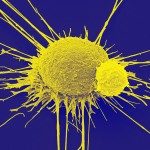Link to Pubmed [PMID] – 16230475
J. Exp. Med. 2005 Oct;202(8):1075-85
Tumor growth promotes the expansion of CD4+CD25+ regulatory T (T reg) cells that counteract T cell-mediated immune responses. An inverse correlation between natural killer (NK) cell activation and T reg cell expansion in tumor-bearing patients, shown here, prompted us to address the role of T reg cells in controlling innate antitumor immunity. Our experiments indicate that human T reg cells expressed membrane-bound transforming growth factor (TGF)-beta, which directly inhibited NK cell effector functions and down-regulated NKG2D receptors on the NK cell surface. Adoptive transfer of wild-type T reg cells but not TGF-beta-/- T reg cells into nude mice suppressed NK cell-mediated cytotoxicity, reduced NKG2D receptor expression, and accelerated the growth of tumors that are normally controlled by NK cells. Conversely, the depletion of mouse T reg cells exacerbated NK cell proliferation and cytotoxicity in vivo. Human NK cell-mediated tumor recognition could also be restored by depletion of T reg cells from tumor-infiltrating lymphocytes. These findings support a role for T reg cells in blunting the NK cell arm of the innate immune system.

